Recurring cycle-based religious festivals
For this story, I will refer to indigenous religion in Zimbabwe as chivanhu. This is a term used to refer to the traditional way of life of the indigenous peoples of Zimbabwe. It is also commonly used in reference to beliefs and practices of indigenous religion.
In indigenous religion, the ordinary rituals or festivals are based on the agricultural cycle and the seasons. A well-known ritual, kurova guva (escorting the spirit from the grave), is not one of these, as it is not routine but depends on certain events.
In this post, I will talk about the ordinary rituals which recur every (agricultural) cycle.
Hwahwa or Doro
Because ritual feasts involve the brewing of beer, they are commonly referred to as hwahwa or doro. So for instance, one might say ‘doro remukwerera‘ or ‘hwahwa hwemavhurachando.’
Kupira and Kuteura
Pouring a libation or sacrificing an animal is known as kuteura. This is done as an offering to ancestral spirits, kupira. Teura means ‘spill (beer or blood of an animal),’ and pira means ‘make an offering.’
Key festivals of indigenous religion in Zimbabwe
A few years back, I attended a rain-asking ceremony known as mukwerera. For those who do not practice chivanhu, this might be the only routine festival associated with chivanhu they have ever heard of. There are others, however. While religious festivals of Christianity centre on Christ and redemption, those of chivanhu seem to focus on ancestral spirits, the economy and livelihood. The common ritual festivals of chivanhu include the following:
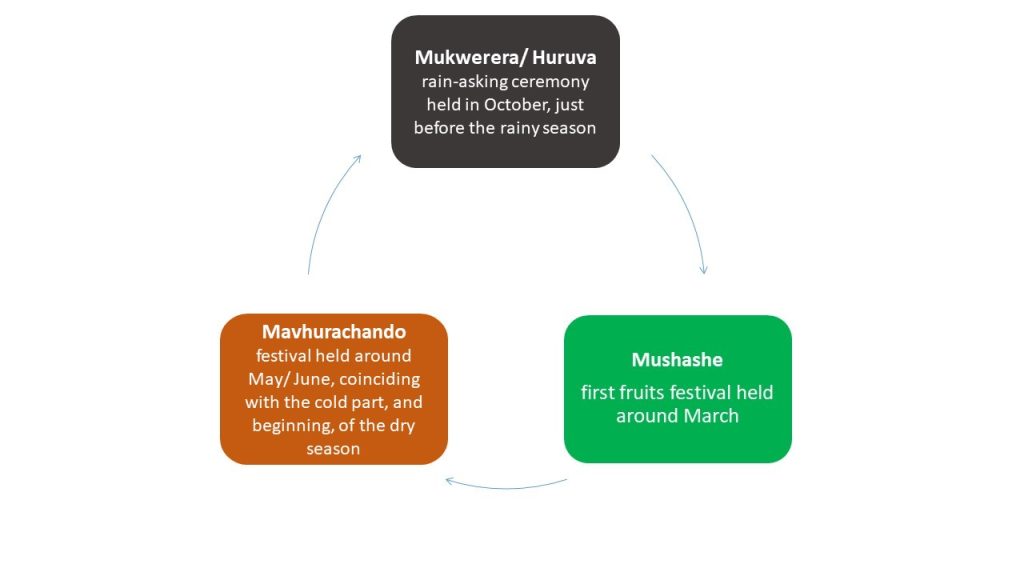
While I have included bira as one of the rituals, it is actually a general reference to a ritual feast. Families hold ritual feasts with various intentions, hence the specific names given to such feasts could vary. One of the more common reasons however is simply to honour the ancestors from time to time.
1. Mukwerera
Mukwerera, also known as mukwerere, is a ritual held ahead of the rainy season, in petition for good rains. November marks the beginning of the rainy season, so this festival is usually held in the month of October. For the Shona, a new month is marked by a new moon. This means that the festival should be held in October but before a new moon marking the start of the rainy season. For this festival, beer is brewed and poured on sacred ground as a libation to the ancestors.
In my village in Mhondoro, mukwerera involves pouring the libation over the graves of the ancestors while a petition is made for rain.
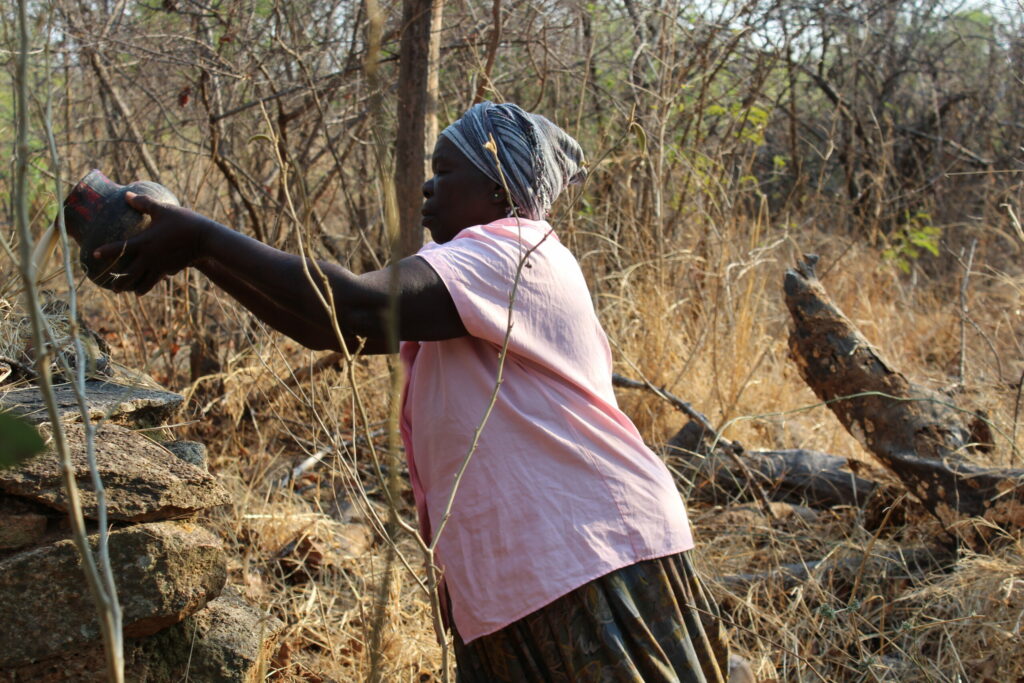
I spoke to a friend who comes from Chirumhanzu, and he was surprised that mukwerera involves going to a gravesite. In his village, the ritual is performed at the top of a sacred hill.
In January 2020, I visited Pasi Kawanzaruwa to learn more about the various ritual festivals. Pasi lives in the Nharira Hills situated between Harare and Norton. Pasi’s father Jacob was a medium of the (great) spirit of Mushore; he was a mhondoro. Mhondoro refers to great tribal spirits. These are spirits of clan founders and kings. It seems, however, that the term is also used to refer to the medium as well.
In Pasi’s account of mukwerera, they perform the libation in the Nharira Hills at 5 different sites they call miti mishanu. At each of these sites is a mubvumira tree (botanical name of mubvumira is kirkia acuminata), under which the libation is poured while a petition is made. Pasi also told me that it was a mubvumira (and not muhacha) tree under which our ancestors would ask for food and it miraculously appeared.
For the ritual, a lamb is taken up to the hill, killed, and burned as a sacrifice. In addition, a beast is also slaughtered for the festival.
When mukwerera is held, it is for the entire community under a chieftaincy. However, not just anybody can lead the mukwerera ritual; there exists a family anointed to do so. Such a family is said to be the ones who inherited the water gourd ladle (vane mukombe wemvura). In addition, all members of the community are expected to contribute inputs to be used for the festival. Such contributions include sorghum or millet and even cash. Pasi told me of how back in the day, even white commercial farmers provided livestock as a contribution towards the festival.
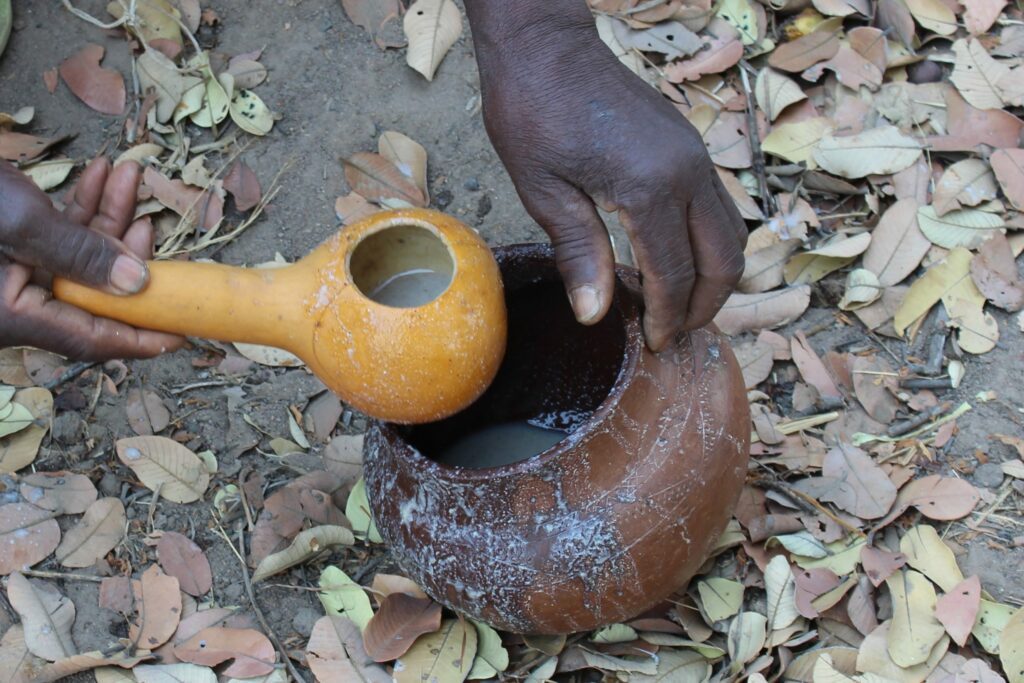
The family anointed to lead the mukwerera ritual is said to have inherited the water gourd ladle.
2. Huruva
I gave Pasi an account of the mukwerera festival I had attended in my village a few years back. Interestingly, he told me that the ritual I witnessed is called huruva, and not mukwerera. He however pointed out that it is not unusual for people to refer to the huruva ritual as mukwerera.
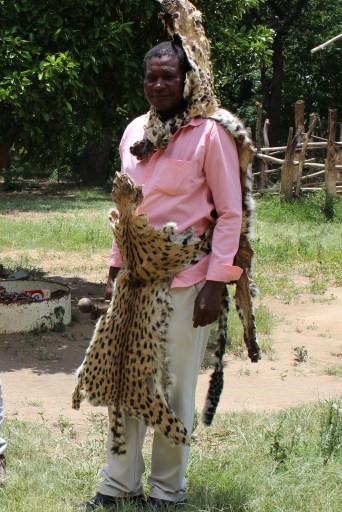
For the huruva ritual, elders visit the grave sites of the ancestors. They clean up the grave sites, weeding and sweeping the site before pouring the libation of beer over the grave, and making a petition for rain. According to Pasi, others do not brew beer for the huruva ritual, but still petition for rain.
3. Mushashe
In the month of March, crops in the fields have ripened. A ritual festival is performed to show gratitude, offering the new crops to the ancestors before they are eaten. This is referred to as kurumisa vadzimu zvitsva (giving the ancestors a taste of the new crops).
Pasi described to me how, in preparation for the ritual festival, women fill their baskets (tswanda and tsero) with a few of the crops such as groundnuts, pumpkins, mealies and pumpkin leaves. The crops are taken to a site specially prepared for ritual offerings known as rushanga. Though not built up, the site has trees such as the muhacha. Here the elders present their offering to the ancestors, this is kupira or kuteura.
According to sekuru Munaku, a spirit medium whom I spoke to in 2019, the ritual is performed to show gratitude to God and the ancestors for successfully cultivating the land. So this festival is celebrated after the field crops have ripened, but well before the harvest.
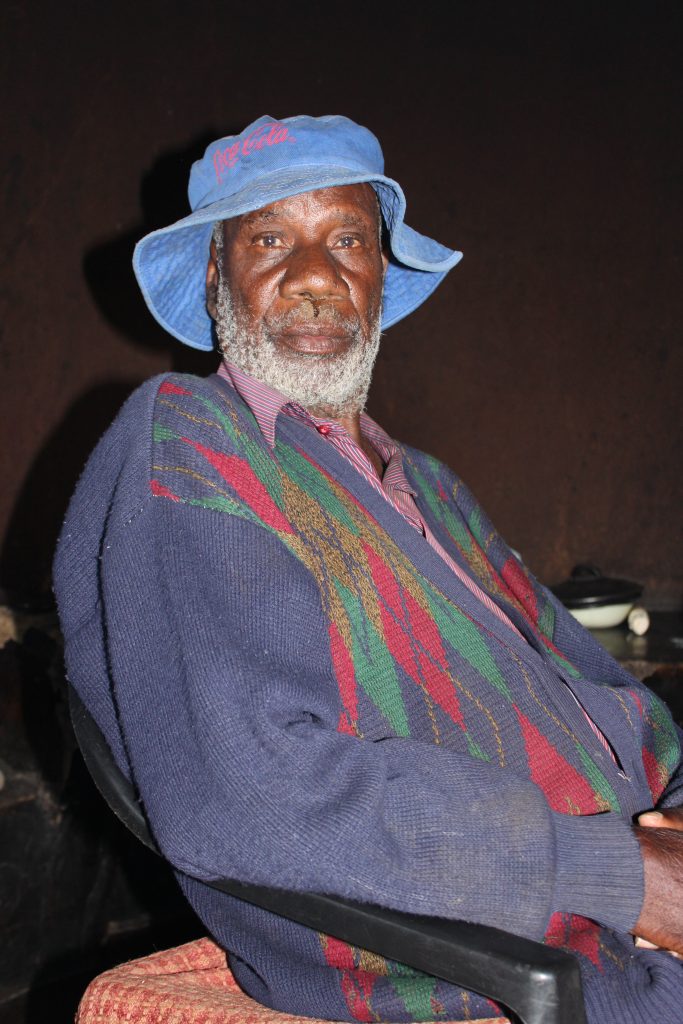
From my separate conversations with Sekuru Munaku and Pasi, they described similar festivals. However, Pasi called the offering of new crops chipwa, while sekuru Munaku called it mushashe.
4. Mavhurachando
When I visited sekuru Munaku, it was towards the end of the month of May, and I found the family busy preparing for a bira to be held that night. It was referred to as bira rechando meaning ‘the cold season ritual festival.’ May/ June is the beginning, and cold part of the dry season, and harvesting is in progress. Sekuru Munaku explained to me that the ritual was to show gratitude to the ancestors for successfully cultivating the land, and now harvesting. In addition, it would also be a celebration of the new season. The festival would be marked by singing, drumming, and dancing in sekuru Munaku’s banya. Banya is a hut reserved for the rituals of a medium.
Pasi, on the other hand, called this festival bira remavhurachando, meaning ‘a festival to mark the start of the cold season.’ He however didn’t mention a specific agenda for this ritual.
It would seem then, that the defining characteristic of this festival is the time of the year it has to be performed. So while the mukwerera festival paves way for the rainy season, mavhurachando marks the start of the dry season.
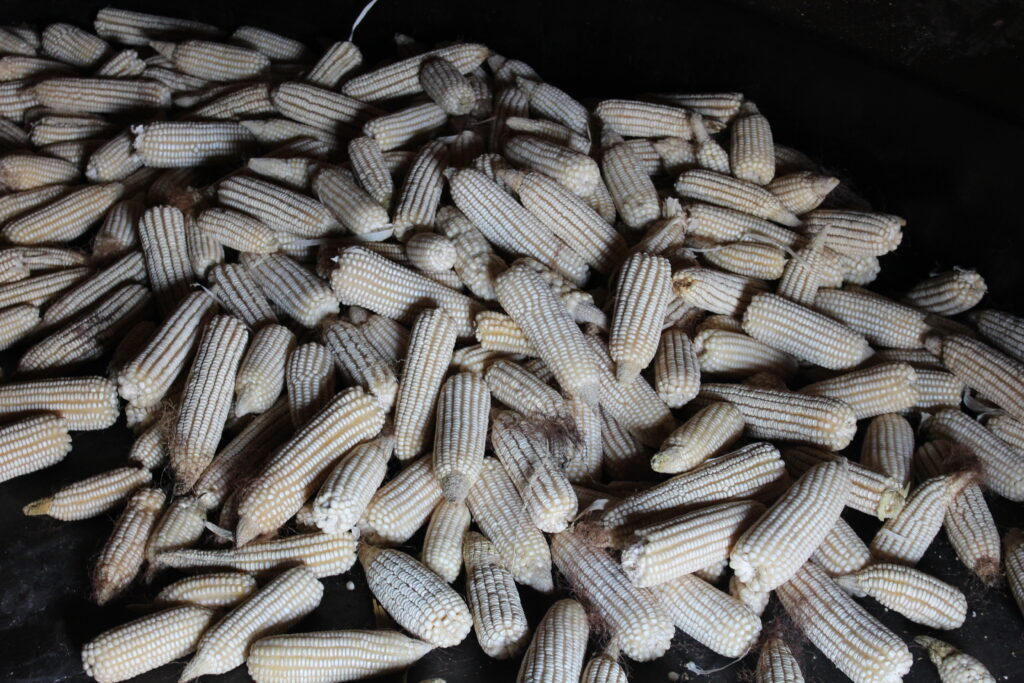
5. Bira (remhuri)
Many families still hold private ritual feasts for various reasons, which range from thanking their ancestors, to formally recognising a member of the family as the host of an ancestral spirit.
Bira to honour the ancestors
Some families regularly make offerings to show gratitude and honour their ancestors. That way the family can secure ongoing protection. During such a ritual a petition is made asking for protection and good fortunes.
Bira with specific intention
In indigenous religion, it is believed that the desire of a mudzimu to manifest itself is communicated through a grave unexplained illness. In such a situation a divine healer is consulted to confirm this, after which a ritual is performed to ordain the host and formally accept the mudzimu.
It is also believed that more often than not, misfortune in life is the result of supernatural forces. Where ancestors are neglected and forgotten they withhold their protection. In this case the remedy becomes an offering to the ancestors.
Conclusion
All ritual festivals in indigenous religion involve honoring ancestors and, more often than not, pouring libations. Most importantly, such festivals relate to the economy and wellbeing of a people.


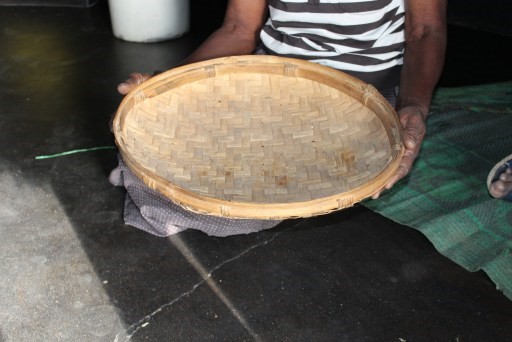
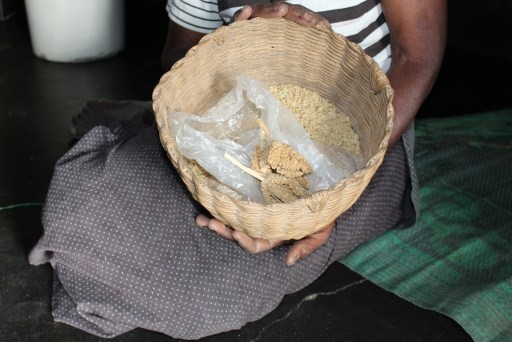
This link help me because I had a project to do and this link help with I want to thank u so much for u love bye
You’re welcome Cayla.
It helped my child when writing her CALA
Hi Monica,
Thank you for the positive feedback. I do hope you will continue to find lots of useful content here.
This site is key in doing CALA….thank you keep researching about us.
Thank you for the positive feedback Florence. Will keep researching!
This is a well researched presentation and I’m not sure how but as black Shona people we really need to put effort in gathering whatever remains of our culture, beliefs and values for preservation because as it stands we are at a very crucial moment where if we lose whatever is left it means as a people we have lost ourselves for ever
Thank you Wamambo for the feedback. It always refreshing to encounter like-minded people.
I would like to express my sincere gratitude for a job well done. If it wasn’t for you, I don’t know how I was going to help my daughter with her research. Thanks once again.
You are welcome Lu. It always feels good knowing my work is of help to others!
Thanks for checking out my blog.
Wonderful. Well researched article.
Hi Michael,
Thank you for the positive feedback, and thanks for checking out ZimbOriginal!
Cheers
Excellent piece of work! Keep it up.
Dr Chitauro,
Thank you for the positive feedback. Sure put a smile on my face!
Regards
Thanks Mkoma for the information shared.Much appreciated. The challenge we encounter indeed revolves around the difficulty in conveying the full depth and complexity of what occurred behind the scenes during these ceremonies.
In many cases, those who were passing down the oral traditions might have had limited information themselves, observing from a distance like spectators on the terraces. Additionally, the Svikiro, who held sacred knowledge, often couldn’t reveal much due to the profound and guarded nature of these rituals. This compounded the challenge of comprehensively understanding and communicating the intricacies of these ancient practices to the wider public.
Okay,here is my contribution-The Mbira played during these ceremonies isn’t just an ordinary instrument; it’s a specially tuned Mbira designed to resonate at a frequency of 396Hz(there are different frequencies for different occasions). By the way mbira dzakasiyana and they play at different frequencies,I challenge you to do a reseach on this, music has a remarkable influence on our emotions and can deeply resonate with us, even across language barriers.
Some songs for example , when crafted with particular melodies, rhythms, and emotional tones, possess the power to connect with our deepest feelings, stirring emotions of lov,hate,anger,affection etc.
Musicians and producers sometimes experiment with frequencies and musical elements to elicit specific emotional responses, creating a profound impact on listeners. It’s a fascinating aspect of how music can shape our emotions and experiences.There are certain songs that when you listen to them you just feel something different.(just for fun check out:Tozvireva tinga putika neshungu i cant find the original but Mbira dzenharira did a cover. and also Somewhere Over The Rainbow by Izzy.)This manipulation of musical elements can influence our subconscious and evoke strong emotions without us fully realizing the underlying mechanisms at play. It’s like a magician’s trick, tapping into our emotions and guiding our feelings through the music itself.
Different cultures employ various instruments and frequencies—Marimbas, Mbiras, Tibetan Bowls,catholic bells(Angelus Bell,Sanctus Bell or Sacring Bell etc) among others—for distinct ceremonies. Scientifically,396Hz and those below it align with the grounding frequency. In certain cultures that have diligently preserved their traditions, it’s referred to as the “root chakra frequency.” This frequency is fundamental to our identity as “vana vevhu” because it connects us to the earth. Its resonance was believed to have dispelled malevolent spirits from the ceremony area,Allowing the svikiro to trip* without hinderance.
Now, concerning Mkwerera, there was an individual (Svikiro) believed to possess the ability to communicate with ancestors. Such individuals were given titles like “Nya,” so in the case of Mkwerera, they would be called Nyakwerera and so on. This Svikiro would ingest certain herbs (commonly Peyote Cactus for those that were still learning, although I refrain from naming others due to their illegality in Zimbabwe—resulting from efforts by vachena to suppress and erase our traditions, a topic we can delve into another time).
Following this, the Svikiro would enter what some urban youths(ghetto yutes lol) might term “tripping,” a hallucinogenic journey. During this state, the Svikiro purportedly communicated with the dead. It’s important to note that only Svikiros engaged in this practice due to its perilous nature, and their experience enabled them to navigate and locate the deceased in these journeys. Legend has it that individuals venturing into these trips risked becoming lost or mentally unwell, or the departed might dissuade them from returning to reality and might die.
These ceremonies involving hallucinogenic experiences were indeed an intricate art form, meticulously orchestrated to ensure a particular set of conditions—right quantities of herbs, precise frequencies of instruments like the Mbira and Ngomas. The aim was to induce an altered state of consciousness akin to the experiences believed to occur in the transition from life to death. Mastery of these rituals required extensive knowledge about the afterlife, communication with the deceased, and navigating the spiritual realms.
Documentation of such practices and beliefs about the afterlife has been more prevalent in certain cultures, notably among ancient Egyptians with their Book of the Dead, Tibetan monks with texts like the Bardo Thodol, and to an extent, in Catholicism, although the depth of these teachings might not be widely known due to potential controversies and historical distortion.
In these ceremonies, specific individuals held the knowledge of playing instruments at precise frequencies and understanding the ritual’s intricacies. Sadly, much of this knowledge hasn’t been passed down to younger generations, leading to a risk of losing these profound traditions and their associated wisdom. Preserving and passing on these traditions could potentially offer valuable insights into different aspects of life, death, and spiritual realms across various cultures.
These Svikiros possessed the ability to converse with the ancestors, who in turn were believed to communicate with a higher power to invoke rain. This process mirrors how Catholics might implore saints, saying, “Maria musande mutisvitsirewo kuna Mwari” Sometimes, these rituals resulted in successful rainfalls, while other times, the outcomes were dire. A negative or “bad trip” wouldn’t just impact the svikiro undergoing the experience; its repercussions could extend to the entire village, causing famine, floods, and other hardships etc
Dear Captain,
Thank you for your detailed comment! I am sure the majority of our readers will find this very useful.
Cheers
Enlightening article, please keep it up.
Regards,
Thank you so much for the encouragement—I’m really glad you found it enlightening!